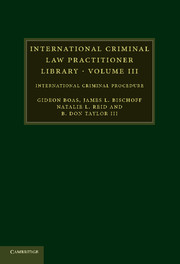Book contents
- Frontmatter
- Contents
- Foreword
- Table of authorities
- Table of short forms
- 1 The nature of international criminal procedure
- 2 Creation and amendment of rules of international criminal procedure
- 3 Procedures related to primacy and complementarity
- 4 Investigations, rights of suspects, and detention
- 5 Defence counsel, amici curiae, and the different forms of representation of accused
- 6 Pre-trial proceedings
- 7 Trial proceedings
- 8 The role and status of victims in international criminal procedure
- 9 Evidence
- 10 Judgement and sentencing
- 11 Appeal and revision
- 12 Conclusion
- Index
- References
6 - Pre-trial proceedings
Published online by Cambridge University Press: 05 August 2011
- Frontmatter
- Contents
- Foreword
- Table of authorities
- Table of short forms
- 1 The nature of international criminal procedure
- 2 Creation and amendment of rules of international criminal procedure
- 3 Procedures related to primacy and complementarity
- 4 Investigations, rights of suspects, and detention
- 5 Defence counsel, amici curiae, and the different forms of representation of accused
- 6 Pre-trial proceedings
- 7 Trial proceedings
- 8 The role and status of victims in international criminal procedure
- 9 Evidence
- 10 Judgement and sentencing
- 11 Appeal and revision
- 12 Conclusion
- Index
- References
Summary
The pre-trial phase at the international criminal tribunals begins with the prosecution's submission of proposed charges and ends with the commencement of trial. During this period, which can last up to several years, the participants prepare for trial in those cases where the proposed charges have passed judicial scrutiny, and the accused has not pleaded guilty to some or all of those charges. At the ICC, this stage takes place under the supervision and control of both the pre-trial and trial chambers, as a case is transferred from one to the other after the charges have been confirmed, and typically well before opening statements. At the SCSL, the same judges hear and manage the case through the pre-trial and trial phases. While the same arrangement may occur at the ad hoc Tribunals in some cases, in others, control of each phase is tasked to a different chamber.
This chapter examines six sets of rules and practices that comprise and define the pre-trial phase of the proceedings. Section 6.1 discusses the law governing the submission, review, confirmation, amendment, and withdrawal of charges. Section 6.2 reviews the joinder and severance of charges, accused, and indictments or trials – tools which facilitate the large trials that have come to characterise proceedings at the ICTY, ICTR, and SCSL, and which may yet become an important feature of ICC procedure.
- Type
- Chapter
- Information
- International Criminal Law Practitioner LibraryInternational Criminal Procedure, pp. 176 - 249Publisher: Cambridge University PressPrint publication year: 2011



